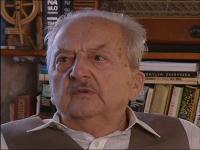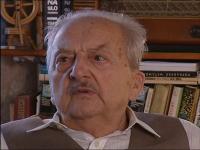“Because he was Hungarian, I asked in Hungarian: “Doctor, what’s the matter?“ No reply. Then I realized that he had died. For two more days I was leaning against the dead body sitting there. A dead body in winter is very cold and I was sitting there and leaning against it for two more days.”

Stáhnout obrázek
Anton Felber was born in Rudňany in 1923. His father worked as a serviceman in the mine and his mother was a dressmaker. He grew up in Košice at his grandparents‘. Later on he studied in Levoča where he met his wife Anna. Together they had three sons. During the Second World War he worked in a building company in Košice. He was accused of being absent for obligatory brigade work and from 1945 until 1948 he was in the labour camp Nuzal in Vladykaukaz. After he returned home, the State Security /ŠtB/ sent him to a labour camp in the Czech Republic for two years for the purpose of re-education.

